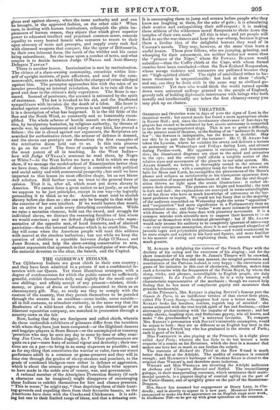THE OJIBBEWAY INDIANS.
THE Ojibbeway Indians are great chiefs in their own country ; and they have been admitted to a private if not a confidential in- terview with our Queen. Yet these illustrious strangers, with a degree of condescension for which the public cannot be sufficiently grateful, exhibit themselves daily and nightly for the small sum of one shilling ; and affably accept of any present—trinket, drink- money, or piece of dress or furniture—presented to them as an eleemosynary gift. Nay, so ready are they to comply with the custom of the country, that they permit themselves to be paraded through the streets in an omnibus—some inside, some outside— all in full costume, to stimulate curiosity, in the same way that the Beefeaters of a wild-beast show, or the corps dramatique of an itinerant equestrian company, are marched in procession through a country-town at the fair.
Now, bating that they are foreigners and called chiefs, wherein
do these outlandish exhibiters of grimaces differ from the tumblers with whom they have just been compared—or the Highland dancers and bagpipe-players in Store Street—or the unemployed or runaway 'prentices who may be seen any day in some by-lane or alley enac- ting Jim Crow, the Indian Juggler, &c. ? Their performances are quite on a par—mere feats of animal vigour and dexterity ; their mo- tives are on a par—to bring in as many sixpences as possible ; and as for any thing that constitutes the warrior or ruler, turn our street performers adrift in a common or game-preserve and they will in time rise through the grades of sheep-stealers and poachers, to the grade of' combined bludgeon-men either in defence or aggression, which is about the utmost progress that any Indian tribe appears to have made in the noble arts of venery, war, and government. A rational member of the Aborigines Protection Society (if such s character can be imagined) might disapprove of encouraging these Indians to exhibit themselves for hire and chance presents. This is worse," he might say," than depriving them of their hunt- stag-grounds and expelling them from their favourite haunts, as the Americans have done with the Creeks and Chickasaws. It is add- ing but one to their limited range of ideas, and that a debasing one. It is encouraging them to jump and scream before people who they know are laughing at them, for the sake of gain ; it is stimulating their avarice and extinguishing their self-respect ; it is making these athletm of the wilderness moral Sampsons to shake down the temples of their own souls." All this is true ; and yet people will flock to see the war-dances and hear the war-whoop, because it gives them a livelier idea of the delightful horrors they read of in COOPER'S novels. They may, however, at the same time learn a useful lesson. These poor fellows, who are jumping, grinning, and whooping for their amusement, are neither better nor worse than the "princes of the Niger," whom Sir FOWELL BUXTON would subsidize—than the Caffre chiefs at the Cape, with whom formal treaties have been concluded—than the New Zealand Rauparahas, whose savage violence and massacres are palliated because they are "high-spirited chiefs." The right of uncivilized tribes to hu- mane treatment is unquestionable: but look at these "chiefs," and say, can they be dealt with in the same way as civilized go- vernments? Yet men who would think the world turned upside down were universal suffrage granted to the people of England, gravely talk of holding diplomatic intercourse with beings who both morally and intellectually are below the first chimney-sweep you may pick up on chance.


























 Previous page
Previous page